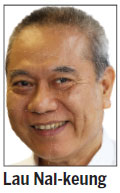Self-censorship or just office politics?
Updated: 2014-02-18 07:13
By Lau Nai-keung(HK Edition)
|
|||||||||
After being abruptly fired, former Commercial Radio talk show host Li Wei-ling offered a memorable line. "I feel 100 percent that this is a suppression of press freedom and freedom of speech by the Leung Chun-ying government," she said.
Outsiders may not get the irony here. Feel 100 Percent is a popular Hong Kong comic book series written by Lau Wan-kit and Yau Ching-yuen. The latter is also - perhaps not incidentally - a seasoned journalist who runs new Web media site Post852. Aptly titled, the Feel 100 Percent is about a hormone-driven adolescent romance, where reason gives way to "feelings". Despite appearances, at times it seems that 48-year-old Li Wei-ling has never outgrown being a teenager. How cute that she said "I feel 100 percent" when referring to her concerns about government censorship. But it is a charge, if proven, which would be very serious indeed.
The Western media has not missed the opportunity to practice its China-bashing routine. Reporting on Li's latest career development, the BBC indulged in the worst form of sensationalism. "Hong Kong's unusually cold weather is expected to end this weekend," its Hong Kong correspondent, Juliana Liu, wrote. "But the press corps here says it is feeling a different sort of chill - one that is unlikely to fade."
The BBC coverage chose to ignore some inconvenient facts. As is well known in Hong Kong, Li had, a couple of years ago, applied for a position with Digital Broadcasting Corporation (DBC) - a rival radio station. This came to light after a meeting with DBC owners was secretly taped and later released. One can imagine what top management in Commercial Radio thought of Li after the exposure. This might well have been the beginning of the deterioration in their relationship. From then on, management only needed an excuse.
In November last year, Li was resigned from her morning talk show On A Clear Day to another timeslot during a program reshuffle. Li used her new show to complain about her employer's decision. She claimed that Commercial Radio had attempted to shut her up. The station's general manager, Rita Chan Ching-han, said this was the final straw.

However, it is likely the reason behind Li's dismissal is simpler - and a lot more personal. Li does not get along with Chan Chi-wan, the radio's former chief executive and current "chief adviser". When Chan announced that On A Clear Day, the show that he took over from Li in November, had boosted its ratings by 6 percent, Li told the press "people would watch Chan even if he does a streak." On Feb 11, Chan took on the new role as Commercial Radio's "chief adviser," and Li was quoted by the Web media House News saying, "Chan destroys, but does not create." Within 24 hours of this remark being made, Li was fired.
Instead of seeing Li's incident for what it most likely was - petty office politics and internal rivalry, the BBC chose to present an elaborate conspiracy theory based on "feel" and "mood". Freedom of the press, for the BBC, seems to include the freedom to be biased.
These unsubstantiated and inaccurate accounts formed the so-called "deteriorated press freedom" discourse in Hong Kong. This was later noted in the World Press Freedom Index, published by the Paris-based Reporters Without Borders - with Hong Kong slipping three places in 2013.
The term "index" often suggests a respectability that is not warranted. The quantitative part of the World Press Freedom Index measures the number of journalists, media assistants and netizens jailed or killed; the number abducted; the number exiled; the number of physical attacks and arrests; and the number who have been censored. These don't really apply to Hong Kong, so clearly the city must have lost points in other areas.
The qualitative part of the index is based on a questionnaire sent to "freedom of expression NGOs", journalists, researchers, jurists and human rights activists - people who, we now realize, have the tendency to report office politics as media self-censorship.
The author is a veteran current affairs commentator.
(HK Edition 02/18/2014 page9)